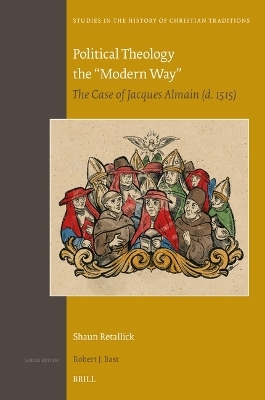
Political Theology the “Modern Way”
Brill (Verlag)
978-90-04-54605-9 (ISBN)
In Political Theology the "Modern Way": The Case of Jacques Almain (d. 1515), Shaun Retallick provides the first monograph on this late medieval philosopher-theologian and conciliarist, and his thought. He demonstrates that Almain's political theology, of which ecclesiology is a sub-discipline, is strongly impacted by the Via moderna. At the heart of his political theology is the individual and his or her will. Yet, the individual is rarely viewed in isolation from others; there is a strong emphasis on community and on the religious and secular bodies through which it is realized. But these bodies, including the Church, are understood in collectivist rather than corporatist terms, which tends to a quite radical form of conciliarism.
Shaun Retallick lectures at McGill University, where he earned his Ph.D. (2021). He has published on political theology and ecclesiology, including on Jacques Almain's notion of ecclesiastical self-defence for Religion and Violence in Western Traditions: Selected Studies (Routledge, 2021).
Acknowledgments
Introduction
1 Setting the Scene
2 Map of the Work
3 Some Methodological Considerations
3.1 Chosen Editions and Translation
3.2 Classification
3.3 Interpretive Issues
Part 1
Foundations
1 Biography of Jacques Almain
Introduction
1 Life
1.1 Who Was Jacques Almain?
1.2 Almain’s Libellus: (Un)official Faculty Response to Cajetan?
1.3 Post-Libellus Career
2 Works
2.1 Legacy
2.2 Humanist Reception: Critiques
Conclusion
2 Almain and the Via Moderna Terminist Logic and Anti-realism
Introduction
1 Terminist Logic and Anti-realism
1.1 Signification and Supposition vis-à-vis Anti-realism: Individual Natures and Men
1.1.1 Introduction
1.1.2 Almain’s Usage
1.1.3 Conclusion
2 Syncategoremata, Supposition and Anti-realist Mereology
2.1 Introduction
2.2 Almain’s Usage
2.2.1 “Whole” (Totus) and “All/Every” (Omnis): Parallel Uses
2.2.2 Realist vs. Anti-realist Mereology
2.3 Conclusion
3 Anti-realist Views on Relations
3.1 Introduction
3.2 Almain’s Usage
3.3 Conclusion
Conclusion
3 Almain and the Via Moderna Voluntarism
Introduction
1 Theological Voluntarism: Ordained Power
1.1 Introduction
1.2 Almain’s Usage
2 Theological Voluntarism: Absolute Power
2.1 Introduction
2.2 Almain’s Usage
3 Anthropological Voluntarism: the Will and Individual Human Beings
3.1 Introduction
3.2 Almain’s Usage
4 Anthropological Voluntarism: the Will and Social Bodies
Conclusion
Part 2
Almain’s Political Theology
4 Key Principles
Introduction
1 Almain’s Political Theology: Key Principles
2 To Be a “Body”: the Organic Analogy
3 Political Bodies
4 The One Mystical Body
Conclusion
5 The Nature of a Community Legal and Philosophical Perspectives
Introduction
1 Ecclesiastical Bodies as Corporations (Universitates)
2 Political Bodies as Corporations
3 Political Consent
4 The Common Good
5 Ecclesiastical Unity
Conclusion
6 The Community as Non-corporate Collective Through the Lens of the Via Moderna
Introduction
1 To Be a “Body”: The Organic Analogy – Revisited
2 Scholarly Analyses on Almain’s Political Theology – Re-considered
2.1 The Church and Ecclesiastical Bodies as Non-corporate Collectives
2.1.1 Introduction
2.1.2 The Church and Dominion: Libellus
2.1.3 The Papal Office and Dominion: Questio and Expositio
2.1.4 The Ecumenical Council and Dominion: Questio
2.1.5 Conclusion
2.2 Political Bodies as Non-corporate Collectives
2.2.1 Introduction
2.2.2 Collectives and Civil Dominion: Questio and Libellus
2.2.3 Collectives and Civil Dominion: Expositio
2.2.4 Collectives and Civil Dominion: A Decima Quarta
2.2.5 Conclusion
2.3 Political Consent
2.3.1 Introduction
2.3.2 Sources on Consent: Questio, Libellus, Expositio, and A Decima Quarta
2.3.3 Consenting Agents: Questio, Libellus, Expositio, and A Decima Quarta
2.3.4 The Nature of Consent: Almain’s Corpus
2.3.5 Conclusion
2.4 The Common Good
2.4.1 Introduction
2.4.2 The Common Good of the Church: Questio, Libellus, and Expositio
2.4.3 The Common Good of Political Bodies: Questio, Libellus, Expositio, and A Decima Quarta
2.4.4 Conclusion
2.5 Ecclesiastical Unity
2.5.1 Introduction
2.5.2 Unity and Almain’s Priorities
2.5.3 Unity in Political Theology Works: Questio, Libellus, and Expositio
2.5.4 Unity in In Tertium
2.5.5 Unity in A Decima Quarta
2.5.6 Conclusion
Conclusion
Conclusion
Appendix A Timeline of Almain’s Life and Other Key Events
Appendix B Excursus on Almain’s Date of Birth
Appendix C Precis of Almain’s Works
Appendix D Editions and Printings of Almain’s Works
Appendix E Total Printings and Re-printings/Later Editions (16–18th Centuries)
Appendix F Students Almain Directed in the Faculty of Arts
Appendix G Select Poetry and Correspondence about Almain
Bibliography
Index
| Erscheinungsdatum | 28.12.2023 |
|---|---|
| Reihe/Serie | Studies in the History of Christian Traditions ; 206 |
| Verlagsort | Leiden |
| Sprache | englisch |
| Maße | 155 x 235 mm |
| Gewicht | 607 g |
| Themenwelt | Geschichte ► Allgemeine Geschichte ► Neuzeit (bis 1918) |
| Geisteswissenschaften ► Geschichte ► Regional- / Ländergeschichte | |
| Geisteswissenschaften ► Philosophie ► Philosophie des Mittelalters | |
| Geisteswissenschaften ► Religion / Theologie ► Christentum | |
| ISBN-10 | 90-04-54605-7 / 9004546057 |
| ISBN-13 | 978-90-04-54605-9 / 9789004546059 |
| Zustand | Neuware |
| Haben Sie eine Frage zum Produkt? |
aus dem Bereich


